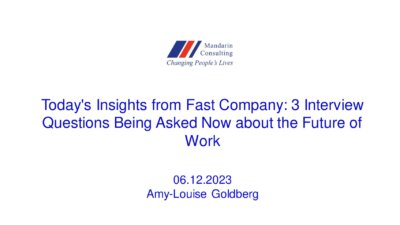12.06.2023 Today’s Insights from Fast Company: 3 Interview Questions Being Asked Now about the Future of Work

Dear Students,
Today, we’re addressing three questions increasingly asked of top-tier job candidates like you, (at least according to Jennifer Lewi, a Career Strategist and Executive Coach, in her recent Fast Company article.)
Lewi’s highlighted queries are worth your considering/discussing in Mandarin Consulting coaching sessions, because: a) ambitious international students like you may well be asked one of them (or something similar) during interviews, and b) when employed strategically (no pun intended 🙂), the very same questions, when posed by an applicant like you in a hiring context, can both uncover useful insights and also help to “market” you to the hiring leader.
The key point: Questions are (Learning and Selling) Opportunities in Disguise!
For your reference, here’s the link to the complete article: https://www.fastcompany.com/90899557/3-interview-questions-recruiters-are-asking-right-now-related-to-the-future-of-work
—
1. HOW DO YOU STAY CONNECTED IN A HYBRID OR REMOTE ENVIRONMENT?
Hiring leaders who pose this question in an interview likely seek candidates who:
- Have an orientation toward working with others (vs. simply independently, as some of your more technically-skilled friends may have enjoyable done for the past 3 years, and some “back-end” types would prefer to continue to do forever!)
- Understand that “communication” doesn’t equate to simply participating in Zoom meetings 7 times a week, whether academically or professionally (This is an excellent STAR story opportunity!)
- Are self-aware enough to recognize that both you, and those with whom you interact, may have distinct communication preferences, which will increasingly impact how we all work
- Have made the effort to adapt to the style(s), work hours, family needs etc. of others during the past few years
- Have some “bumps and bruises” to show for challenges you’ve faced – and addressed – regarding communication, both technological and otherwise, during the pandemic
- Are familiar – and comfortable – with a range of communication modes, including email, text, Slack channels, Zoom/Skype/Teams, live meetings, written reports and even handwritten notes, when appropriate (by the way, your supervisors, who were raised in an earlier generation, really appreciate these!)
Aspiring professionals like you may also want to ask this question, to assess more about if the organization is a fit for you:
- If the company’s representative simply responds with a smile: “We track all of our employees by their phones” that may feel a bit too restrictive for you – and it’s better to know this early on!
- Perhaps the hiring leader reports proudly that the firm has always had a hybrid environment, which may be consistent with an environment you’re looking for
- Upon hearing about a variety of steps the company has taken to “connect” its employees, a student like you may actually feel more confident that you will be kept in the loop about company communications, and get really excited about working there!
- When learning that a potential employer is currently testing out ways to evolve an already-strong employee culture, towards a newly implemented hybrid set-up, you may actually be able to leverage your knowledge about a novel approach/to capitalize on the question to share your insights (read: STAR story!)
2. HOW DO YOU SUPPORT DIVERSITY, EQUITY, AND INCLUSION?
While ambitious international students like you may choose to pose this question in a slightly indirect way, it is nonetheless valuable for you to gain a sense of a company’s commitment in this area, if you’re seeking a fulfilling work environment. For example,
- You might ask “How are new hires integrated into the organization?,” listening to hear if there are employee resource groups (ERGs) for BIPOC (Black, Indigenous, People of Color) and other less-represented populations
- It’s helpful to ask, and observe the response to, “Do you hire for culture-add, or mostly for culture-fit?,” as progressive companies are increasingly moving in the direction of the first
- If the recruiter simply responds “Well, we treat everyone the same,” it may be a sign that the firm has not yet really committed itself to identifying the specific needs of identified populations or even admitting that true equity is not a simple proposition
- A firm that responds proudly with a list of initiatives and activities, while verbalizing that true DEI is an ongoing journey, is likely one where new learning and unique perspectives are likely to be welcomed and you may feel supported
- Hearing “Well, that’s one of the initiatives on our agenda for next year, if we get to it” likely does not reflect an environment that would be especially conducive to those from non-majority populations
Conversely, a recruiter asking a new graduate like you (who may have never even held a professional leadership role yet!) a similar question may be seeking:
- To learn if an eager aspiring talent like you, or one of your friends, has ever given much thought to the differences among those of varying backgrounds among your university peer group
- To get a sense of how familiar a student like you may be with the concepts and terminology of DEI, LGBTQ+, intersectionality and bias, and why these matter
- A “STAR” response with an example, perhaps, of how you have demonstrated “inclusive” behavior on an academic project you’d recently completed
- A query in response, showing deeper thought on the issue, such as “That’s a great question. Before I respond, could you please share with me how your company defines the term ‘DEI?'”
- A “high-emotional intelligence” response such as “I recognize that this is a complicated area, and I actively seek to learn more about it” (followed by what you are doing to support that statement)
- To catch any “red-flag” behavior from a student (definitely NOT you!)who has trouble mediating conflict